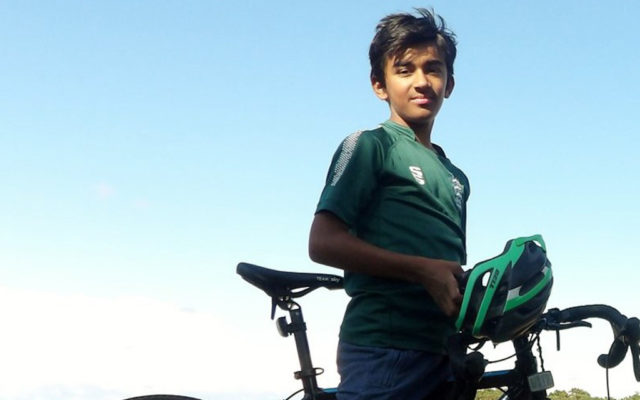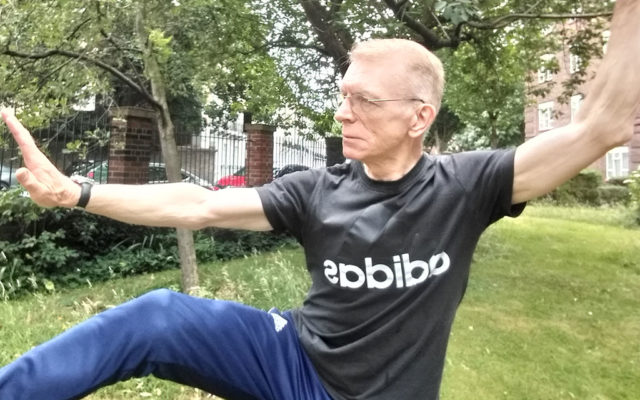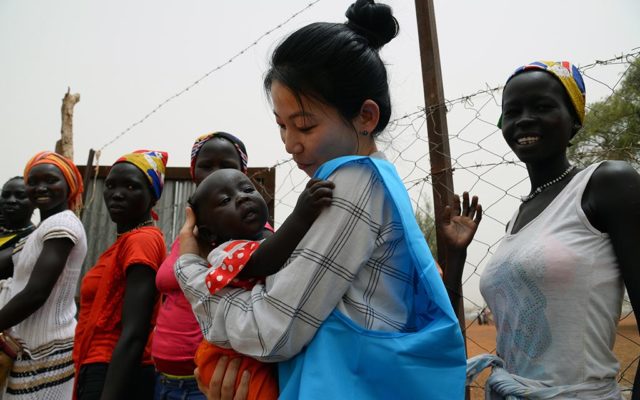Young voices for change: meet Forced to Flee
Originally a school project, Forced to Flee has interviewed former UN Secretary-General Ban Ki-Moon and advocated for refugees globally.
© Forced to Flee
Aryan has been advocating for refugees and displaced people since the young age of 12. In 2018, he launched Forced to Flee, a not-for-profit organisation to raise awareness of the plight of refugees globally. Three years later, Aryan’s idea has turned into a dream team of eight and counting.
The funny thing about the refugee crisis is that it really does affect anybody. Conflict and persecution: it can happen to anyone, right?
The Forced to Flee team isn’t just a prime example of the power of youth-led activism, but a living testament to the power every person has in enacting positive change. UK for UNHCR got the opportunity to speak to both Aryan and Forced to Flee’s Assistant Director and Advocacy Lead, Jess:
So tell us a little bit about why you started Forced to Flee?
Aryan: Forced to Flee was born in 2018 and it came from a school project that I started. You could have written an essay or do something creative. I could not write an essay for my life, so I decided to do something creative and make a website. I chose my topic area after speaking to my grandparents; my grandmother was telling me a lot about how they migrated from Uganda when my dad was 6–months–old. Their experience, their journey, how they had to leave everything behind because the leader at the time Idi Amin said you could only take one suitcase, no jewellery, no expensive anything, just clothes. Luckily, Britain was accepting migrants freely at the time and one of my grandad’s brothers was living and working in the UK, so they didn’t have to stay in migration accommodation. So that’s why I decided to focus on refugees and migrants.
It was just me at Forced to Flee for two years, I started doing interviews, I spoke to people who related, I started fundraising for UNHCR as I thought they did incredible work, I tried to get as many people to support us as possible. That’s how it started! And the one positive about Covid is that Forced to Flee was starting to get members and Jess was the first person to join. It just took off from there. For the past eight weeks, we’ve had someone new join every two weeks, which is incredible.
Jess: The funny thing about the refugee crisis is that it really does affect anybody. Conflict and persecution: it can happen to anyone, right? I was really surprised to receive a letter a few years ago from my great-grandmother after she passed away. It detailed her experiences as a Jew in Nazi-occupied Italy during the Second World War. I read this letter which contained information about her plight and my grandfather, who was very young at the time, his plight as well. I read this story and I was completely blown away. It was an eloquent piece of work, but there were aspects of it that surprised me. That was my first exposure to the idea of forced displacement. They weren’t refugees, they were IDPs, so they were internally displaced within Italy, but it was still quite a harrowing thing to read. So that was probably the first time I realised how indiscriminate conflict can be. In addition, my family is quite involved when it comes to the plight of refugees. My dad does a lot of photography and he used to disappear for months at a time to take photographs at quite perilous borders that I was not allowed to go to. Helping other people has been quite a large part of my upbringing as well.
View this post on Instagram
What was it like interviewing Ban Ki-Moon? What were some of the key takeaways?
Jess: He’s always been a major source of inspiration for me. UN Secretary-General aside, as I mentioned, he’s also a Korean global leader. As a half-Korean, this was something I hadn’t seen a lot growing up in the media and he was actually a refugee during the Korean War. So, my grandparents were young during the Korean War and I was able to draw some parallels between his family history and mine. For a start, the main takeaways were that it is possible to overcome adversity. As Secretary-General, he was quite passionate about assisting refugees and a lot of that stemmed from his childhood difficulties as a displaced child. So, that was something I made sure to remember. A lot of the time, adversity can be a setback, but there are ways to turn it into something positive and generate passion and fuel an interest from what you faced as a young person. Another key takeaway was that the refugee crisis requires solidarity to overcome. So, as the former Secretary-General of the UN, I did expect him to be quite passionate about having people and nations come together, but what I realised was that when people, nations and leaders are able to look beyond their own self-interest, there becomes a real potential for reformation. When it comes to the refugee crisis, you can’t just think in terms of your own country and yourself, you have to think about other countries and other people.
The final takeaway is that young people, their activism and their advocacy, that is something worth listening to. He said as a young person, he used to be frustrated by how much passion he had, but his inability to kind of turn it into a bigger movement. He was quite insistent that young people have the power to bring about change if they have the resolve to do so. Something he said towards the end of our discussion that really resonated with me was, “Keep your head above the clouds, but your feet firmly planted on the soil.” So this idea of being ambitious and optimistic, but at the same time being grounded by sustainable solutions.
To learn more about Forced to Flee, you can visit their website or follow them on Instagram.
For more information on how you can help refugees and displaced families, visit our website.




